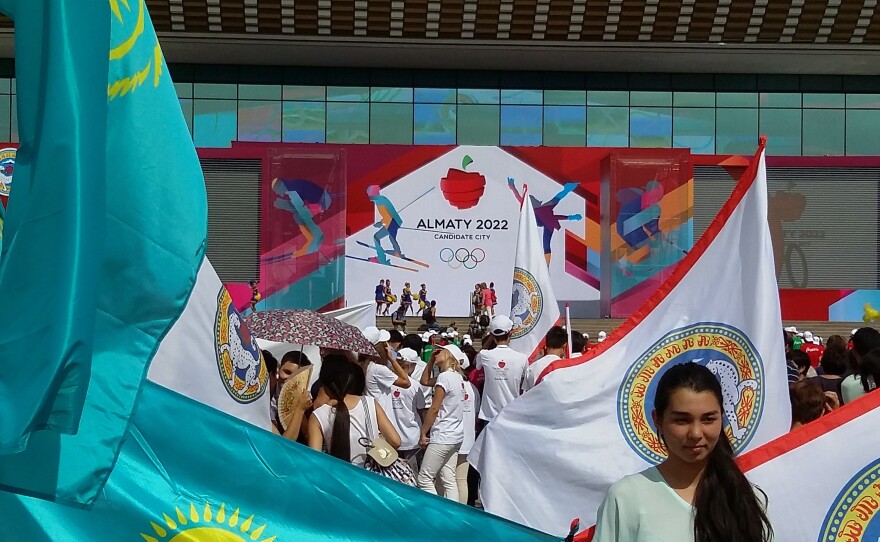There was a moment of drama in global sports on Friday, when the International Olympic Committee chose Beijing to host the 2022 Winter Games.
The loser was Almaty, Kazakhstan, a major city in an oil-rich central Asian nation that's trying to raise its profile on the international scene.
The loss was a tough one for the government officials, boosters and developers who've been working to convince the IOC that their country is ready to produce a major world sporting event.
The nearly two-year process involves detailed presentations about what each potential host city can bring to the Olympic experience, what kinds of infrastructure it will build and what kinds of guarantees the host country can offer to ensure a successful event.
Few doubted that Kazakhstan could afford to produce the Games. It's a major oil and gas producer with a taste for building mega projects, such as its gleaming new capital city, Astana.
But bigger, richer and more experienced cities, including Stockholm, Munich and Oslo, dropped out of the competition, in many cases because they couldn't garner enough public support. One reason is that voters fear the production would just be too costly: Russia drew widespread scorn for spending more than $50 billion on the 2014 spectacle in Sochi, prompting even the IOC to call for fiscal restraint.
The competition eventually came down to two countries with authoritarian governments that are less dependent on public opinion: China and Kazakhstan.
Of the two, Kazakhstan offered what it said was the most authentic winter sports experience. Its proposed host city, Almaty, has a lot of appeal, sitting at the foot of a stunning mountain range that's capped with snow, even in the summer.
A slickly produced promotional video proclaimed the city's bidding slogan, "Keeping It Real," a reference to the fact that Almaty has plenty of real snow in the winter, whereas China's venues would probably have to use man-made snow.
Those mountains were on display Friday as the backdrop for a rally in one of the city's main squares.
About a thousand people waited to hear the verdict from the International Olympic Committee, beamed live from Kuala Lumpur, Malaysia, on two giant TV screens. The city provided a lot of hoopla — including waving banners, cartwheeling cheerleaders and pounding music — to get the crowd pumped for what organizers hoped would be an ecstatic victory celebration.
It was not to be. As soon as the committee announced that Beijing would be the host city, the crowd's mood deflated. People rolled up their flags and evaporated from the square.
But not everyone was unhappy to see Kazakhstan's bid fail. The idea stirred a lot of opposition from the very beginning, much of it from people who saw the Olympics as a waste of money. Rasul Jumaly, a political scientist and former diplomat, says his country isn't ready to host such a costly event, "because of the very weak economic and social level in Kazakhstan, taking into account the very high level of corruption."
Jumaly points out that Kazakhstan scores poorly on worldwide indices of corruption; Transparency International put the nation among the worst 15 percent in its Corruption Perceptions Index for 2015. Jumaly fears that a big spending project like the Olympics would give crooked politicians and developers a chance to inflate costs and skim money. He says there are better and far more accountable ways to spend those resources.
"First of all, I think it must be developing human capital," he says, "I mean the educational system, the health care system, and the infrastructure, not just for Almaty and Astana, but cities in the rest of the country."
Other critics fault Kazakhstan's president, Nursultan Nazarbayev, for lavishing money on jaw-dropping architecture and international events, while neglecting to wean the country from its dependence on oil production.
One promise made by supporters of the Olympic bid was that it would help diversify Kazakhstan's economy by attracting tourism.
Opponents say there are better ways to do that, too.
Dmitry Zhukov is an environmentalist and financial analyst, who commutes in Almaty's congested traffic on a bicycle. He says Kazakhstan should invest in tourism that will make the most of its hospitable people and its natural attractions.
"We still have very vibrant nomadic life," he says, pointing out that visitors can meet nomadic herders just a half-hour's bike ride from the city. "We have vast tracts of unspoiled mountains and steppes and desert and people who are just enthusiasts of nature or tourism; they go out and take pictures which are shared millions of times around the world."
Ecotourism and ethnotourism, Zhukov says, would be the best long-term way to attract visitors to the country, not one-time mega sporting events.
Copyright 2023 NPR. To see more, visit https://www.npr.org. 9(MDAzMjM2NDYzMDEyMzc1Njk5NjAxNzY3OQ001))






